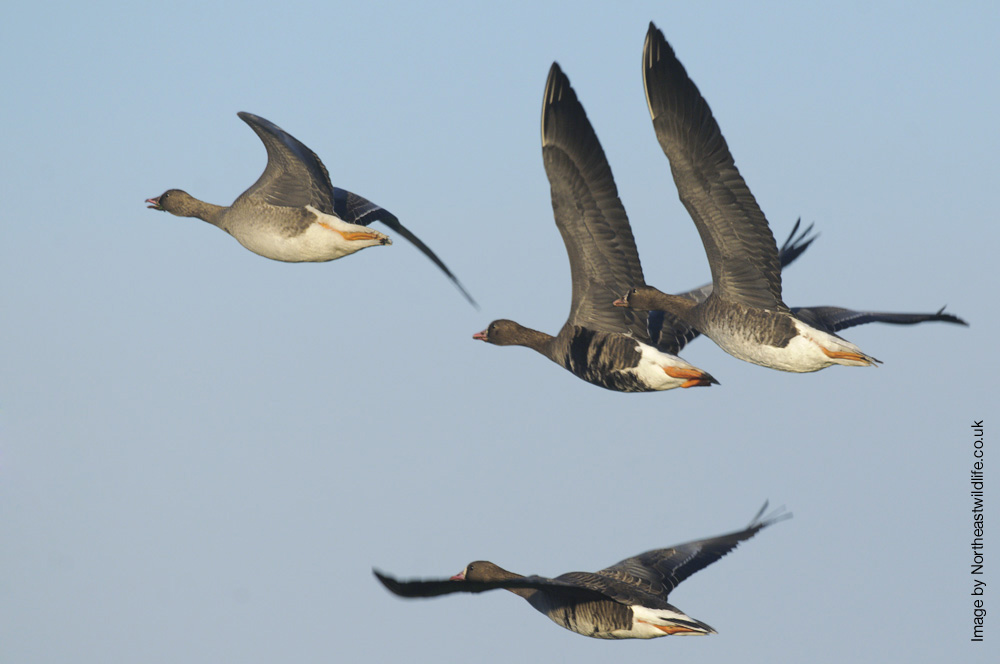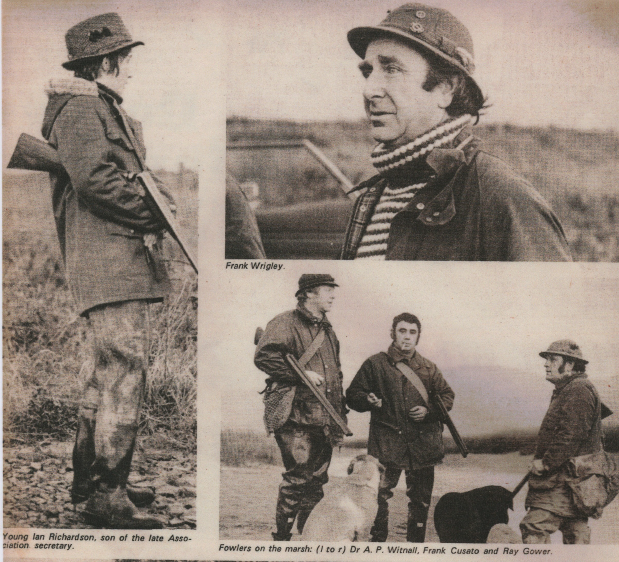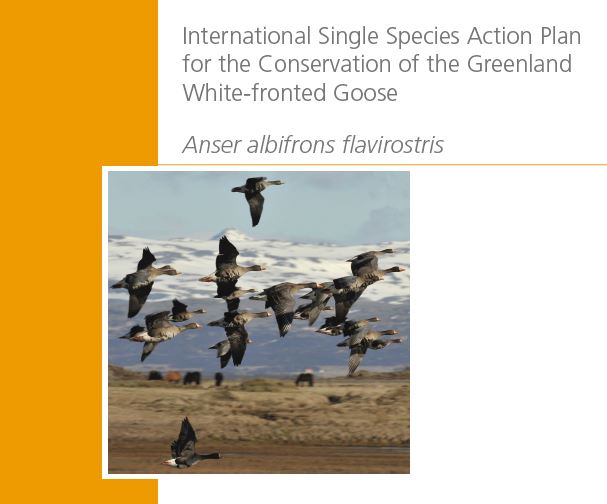 From 11th January to 7th March 2016 the Welsh Government ran a public consultation seeking views on either removing white-fronted geese from the quarry list or continuing to support a voluntary ban on shooting Greenland white-fronted geese.
From 11th January to 7th March 2016 the Welsh Government ran a public consultation seeking views on either removing white-fronted geese from the quarry list or continuing to support a voluntary ban on shooting Greenland white-fronted geese.
BASC raised awareness of the consultation in its magazine, on its website, through social media and by email. BASC called on all shooters to support option 5 in their responses to the consultation, which is to retain the existing voluntary ban on shooting Greenland white-fronted geese.
Wildfowlers on the Dyfi estuary have been protecting the main over-wintering population of Greenland white-fronted geese in Wales with an effective voluntary shooting moratorium for 44 years. There is no evidence that the voluntary moratorium on shooting Greenland white-fronted geese has been broken. Rather, we have overwhelming evidence that a conservation alliance between wildfowlers and bird conservation bodies is the best hope the remaining few dozen geese have on the Dyfi estuary. However, protectionists continue to lobby the Welsh Government for the species to be taken off the quarry list.
RSPB Wales and the Welsh Ornithological Society asked people to email the Welsh Government in support of removing white-fronted geese from the quarry list.
Five options were given in the consultation document. The first four options were various ways of taking white-fronted geese off the quarry list. BASC responded to the consultation in support of option 5, which is to “maintain the non-statutory voluntary ban of shooting of Greenland white-fronted geese in Wales on land over which the wildfowling clubs have specific rights to shoot”.
Many thanks to everyone that took part in the consultation. This webpage will be updated if there are any developments to report.
BASC response
 Some points of interest from BASC’s response are as follows:
Some points of interest from BASC’s response are as follows:
- In 1972, wildfowlers on the Dyfi estuary initiated a voluntary moratorium on shooting Greenland white-fronted geese.
- In 1973, Dyfi and District Wildfowlers’ Association initiated a rearing and release programme of pure bred Greenland white-fronted geese in memory of Ian Richardson, the late club secretary, who was killed in a motor accident on his way home from the shoot dinner.
- The Wildfowlers’ Association of Great Britain and Ireland (WAGBI) was a principle funder of the first British expedition to Greenland in 1979 to study the Greenland white-fronted goose. Click here for video footage.
- BASC has a long involvement in conservation and legislative protection of migratory birds. BASC was involved in the establishment of the Africa-Eurasian Waterbird Agreement (AEWA) in the 1990s, and is active in the AEWA Technical Committee and working groups for single species action and management plans. BASC is a signatory to the 2012 AEWA single-species action plan for the conservation of Greenland white-fronted geese.
- It is clear that Greenland white-fronted geese are in need of conservation measures as they migrate to and from their wintering grounds in Wales. That is why for over forty years wildfowlers on the Dyfi estuary and elsewhere have been protecting overwintering birds with an effective voluntary moratorium on shooting.
- The voluntary moratorium is effective, there is no threat to the European white-fronted goose population and European white-fronted geese rarely visit Wales. Poor breeding productivity of white-fronted geese in Greenland needs to be targeted, not moving from voluntary to statutory protection in Wales.
- The AEWA action plan does not require the Welsh Government (or Defra for that matter) to issue a public consultation on the legal status of white-fronted geese. It requires the Welsh Government to send representatives to an international meeting to consider responses to the continued deterioration of the global population status. This meeting has not yet taken place.
- The main factor determining the global population of Greenland white-fronted geese is breeding productivity in Western Greenland.
- The consultation focuses on the possible risk of birds being shot in Wales with no mention of the risk of collision impacts with inappropriately located wind energy developments. This is surprising given that the AEWA action plan specifically identifies inappropriately located wind energy developments as a threat.
 In December 2015, a planning inspectorate report was published on the implications for European Sites of a proposed North Wales wind farms connection. Concerns were raised about risks of the proposal to Greenland white-fronted geese. Although the Welsh Government had raised a concern prior to the submission of the application and in written submissions during the examination about a potential effect on Greenland white-fronted geese it did not attend any of the hearings, or state during examination that it considered that there was likely to be a significant effect on the birds. The applicant suggested that bird deterrents were disproportionate and unnecessary. Natural Resources Wales view was that it did not advocate an additional requirement to fit diverters on the overhead line in order to make it more visible to birds.
In December 2015, a planning inspectorate report was published on the implications for European Sites of a proposed North Wales wind farms connection. Concerns were raised about risks of the proposal to Greenland white-fronted geese. Although the Welsh Government had raised a concern prior to the submission of the application and in written submissions during the examination about a potential effect on Greenland white-fronted geese it did not attend any of the hearings, or state during examination that it considered that there was likely to be a significant effect on the birds. The applicant suggested that bird deterrents were disproportionate and unnecessary. Natural Resources Wales view was that it did not advocate an additional requirement to fit diverters on the overhead line in order to make it more visible to birds.- If the Welsh Government takes white-fronted geese off the quarry list (options 1-4) this represents a significant change in policy towards removing all risks of mortality for white-fronted geese in Wales. Therefore the Welsh Government will be obliged to carry out a review of all proposed and existing wind energy and similar infrastructure developments in Wales to ensure there is a zero-risk of collision.
- BASC supports option 5, which is to retain the existing voluntary ban on shooting Greenland white-fronted geese.
- Option 5 satisfies the requirements of the EU Birds Directive (2009/147/EEC), the Natural Environment and Rural Communities Act 2006, the African-Eurasian Waterbird Agreement and the Legislative and Regulatory Reform Act 2006.
- Option 5 supports the real conservation effort that all stakeholders agree is necessary to promote the conservation of white-fronted geese in Wales.
- The cost to the taxpayer of updating legislation for no material benefit is not a good or responsible use of public funds. If the Welsh Government wishes to improve the status of Greenland white-fronted in Wales then it should continue to invest in research and habitat work to ensure birds return to their breeding grounds in Greenland in the best possible condition.
Click the link below to download a full copy of BASC’s consultation response.
[download id=”1174″]
Click here for more information on the public consultation